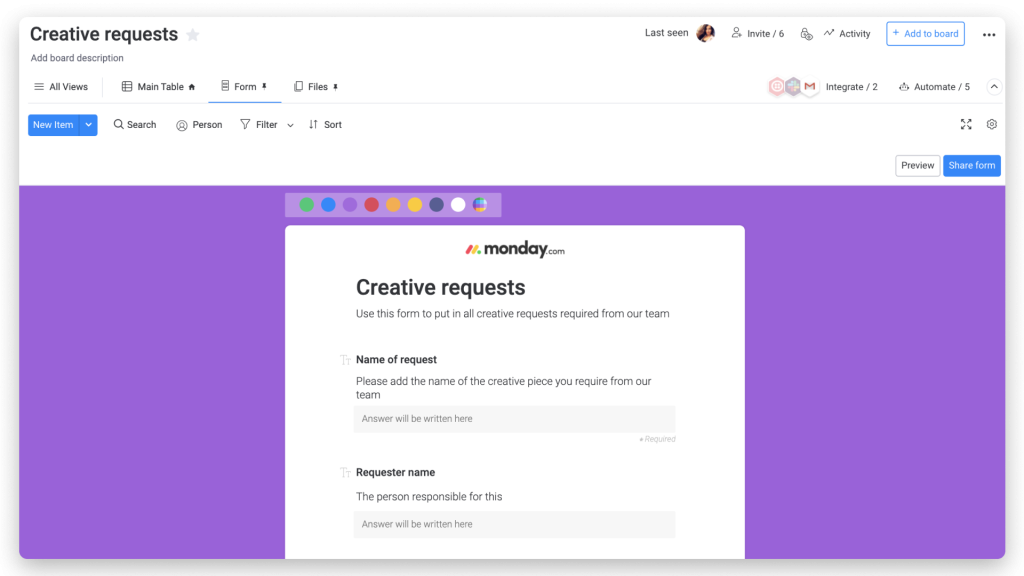
Collating the data you need for a vivid picture of your (potential) customers ensures your people can dedicate their time and energy to higher-value opportunities, for greater ROI. Knowing exactly where customers are in your sales funnel then means you can take the right, tailored steps to move them further along. What’s more, consistent updates and communication allow your teams to create the detailed, bespoke experience your prospects and customers are looking for.
In short, the right CRM can be game-changingly useful in sales management. Here, we explore exactly why — as well as how to select and smoothly implement the right CRM for your business.
1. Create a single source of truth
Capture information, record details and track all prospects and customer interactions that could increase your closing rates.
2. Enhance your customer relationships
The CRM’s namesake, and why it was invented. Maximise customer satisfaction and customer lifetime value, drive more sales and resolve customer issues faster by accessing accurate information relevant to each customer’s needs.
3. Gain clarity and efficiency
Streamline your communication records, account details and other critical customer data to gain a deeper understanding of your customers and create pleasant experiences for them.
4. Ease pressure on people and IT
Spreadsheets, email and documentation will only take you so far. They often lead to confusion, along with internal infrastructure maintenance stress for your company’s IT teams.
5. Gain data-driven insights
Make data-backed decisions and leverage the tools you need to optimize forecasting sales and automate tasks, marketing campaigns and customer support workflows.
CRM tools lend sales teams eyes and years across each step of the customer’s journey:
Let’s explore in more detail:
Without the right CRM, lead management can be one of the most time-consuming aspects of a sales pipeline. It oversees the majority of your sales process, from lead generation through to nurturing and qualifying, until a deal is closed.
A birds-eye-view dashboard featuring information allows sales teams to craft proactive, personalised and time-sensitive customer messages for an enhanced experience. This could include:
✓ Customer preferences or requirements
✓ Order status
✓ Service tickets
CRM can also free up considerable time by automating error-prone, administrative tasks, such as:
With centralised data, the entire organisation can access the latest information on each prospect or client. This improves efficiency and empowers your sales teams to focus on revenue-generating tasks.
CRM automations also include notifying sales teams when an action is needed so that they don’t have to be constantly checking or looking for emails and notes for updates. This helps sales:
✓ Stay better organised
✓ Prioritise requests
✓ Quickly follow up on tasks
✓ Predict future demands
Analytics tools can also help make sense of data and identify trends and patterns. This enables your sales teams to proactively seize opportunities and eliminate those little mistakes that can cost them a customer.
Stagnant customer experience. Inefficiency. Poor communication and cross-team collaboration. Fewer insights. Lack of scalability. Missed opportunities for growth.
Sales teams who are unenthusiastic about their current CRM, or who don’t have one in place, often find themselves facing these problems. Let’s unpack the factors behind these barriers to sales success:

You can use monday.com templates and boards to create just about any form you can imagine. They help your team manage all information in one secure place so you can stay up-to-date with all your requests and deals.
Your CRM is only as good as the data you collect. As a result, it’s vital to make sure that everyone logs essential information correctly.
It’s also important to streamline data collection processes to reduce issues with incorrect information. This could be as simple as stopping to request data that you don’t need: for example, if your internal teams have no plans for sending direct mail, don’t ask for contact addresses.
It’s easy to get distracted by elements of your CRM data that perform differently. Aligning which information tells you where prospects are in your sales cycle and which metrics will impact your sales pipeline allows you to measure performance more effectively.
Dashboards are a great way of visualising progress and gathering insights — a powerful CRM system should be able to provide the reports you need at a glance.
Most CRMs offer marketing capabilities or integrations with third-party automation systems. Yet this feature often stays underused due to knowledge gaps, lack of staff resources, or low management priority.
Leveraging your CRM data in this area will have a resounding impact across your business, transforming your marketing efforts into the engine that boosts customer relationships and increases revenue.
We love working with Provident because they have such in-depth subject matter knowledge on monday.com’s various use cases. This enables our customers to access the full value of the technology, faster.
– Xi Weng, monday.com UK and Ireland Channel Partner Manager
To explore the transformative potential of management software tailored to your business goals, reach out to our team via the button below. We’ll be glad to talk with you!